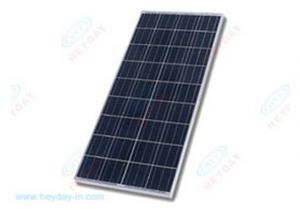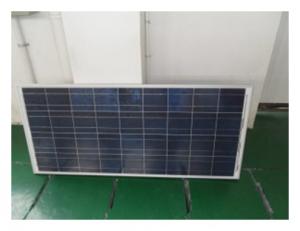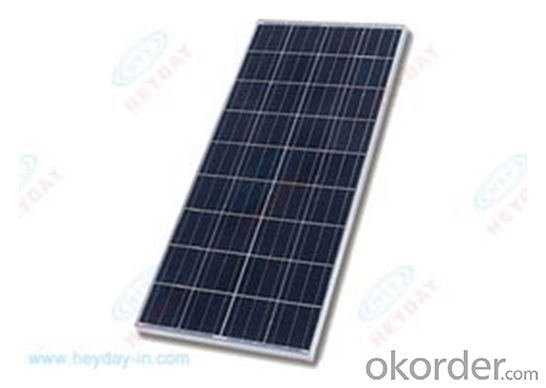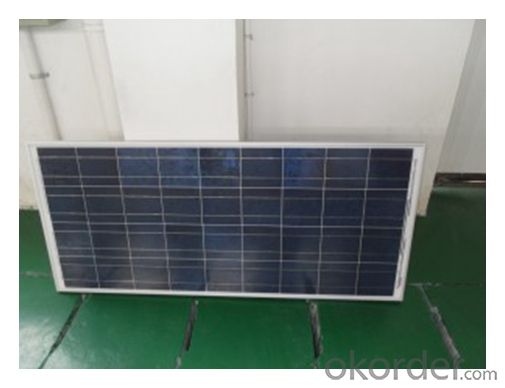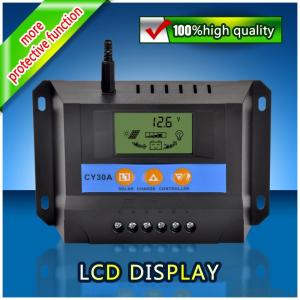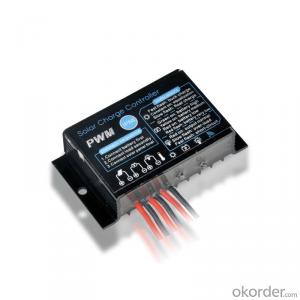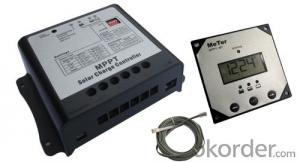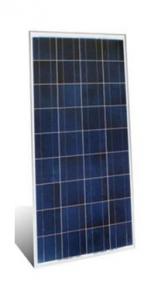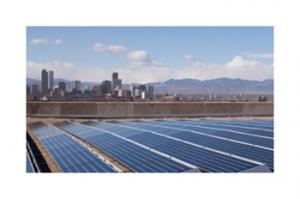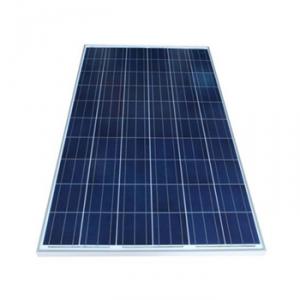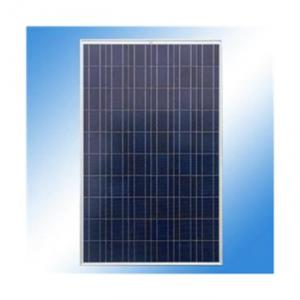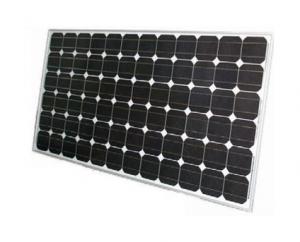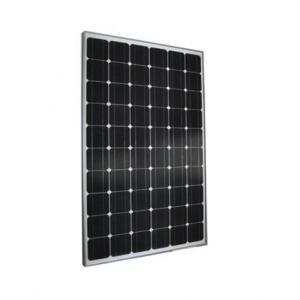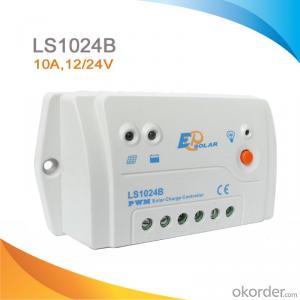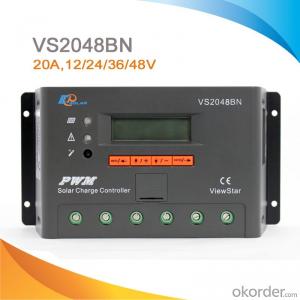Solar Battery Controllers Compatible Poly-Crystalline 135W 156*156 Solar Modules
- Loading Port:
- China Main Port
- Payment Terms:
- TT or LC
- Min Order Qty:
- -
- Supply Capability:
- -
OKorder Service Pledge
OKorder Financial Service
You Might Also Like
Solar Module Descriptions:
PV systems use the most abundant energy source on the planet, solar radiation, to generate electricity. They are silent, consume no fuel and generate no pollution. They also contribute to the reduction of greenhouse gas emissions; a 2kW PV system on a house will prevent the emission of about 40 tonnes of CO2 during its projected 30 year lifetime. Furthermore, the use of PV will reduce your electricity bills and exposure to fluctuating and steadily rising electricity prices.
Customers benefit from our progressive system innovations. Around the world, we meet our customers' desire for the greatest possible reliability, long-term performance and aesthetic integration. No matter which kind of roof – we always have the right solution.
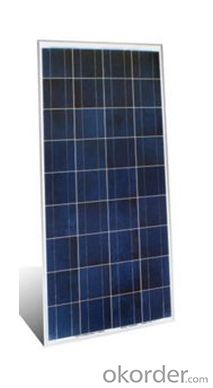
Electrical Characteristics
Max-power (W) | 135 |
Max-Power Voltage (V) | 18.0 |
Max-Power Current (A) | 7.5 |
Open-Circuit Voltage (V) | 21.85 |
Short-Circuit Current (A) | 8.18 |
Mechanical Characteristics
Cable type, Diameter and Length | 4mm2, TUV certified, 1000mm |
Type of Connector | Compatible with MC4 plug |
Arrangement of cells | 4*9 |
Cell Size | 156*156 |
Dimension | 1482*676*40 |
Weight | 12Kg |
Glass, Type and Thickness | High Transmission, Low Iron, Tempered Glass 3.2mm |
Features
Guaranteed positive tolerance 0/+5w ensures power output reliability
Strong aluminum frames module can bear snow loads up to 5400Pa and wind loads up to 2400Pa.
Excellent performance under low light environments (mornings evenings and cloudy days)
12 years for product defects in materials and workmanship and 25 years for 80% of warranted minimum power.
Certifications and standards: IEC 61215.
Manufactured according to International Quality and Environment Management System (ISO9001, ISO14100).
FAQ
Q: Do you have any MOQ limit?
Our MOQ is 200 pieces.
Q: How long is the warranty period for the solar modules?
15 years 90% of its nominal power rating.
25 years 80% of its nominal power rating
Q: What kind of loads can I run on PV?
With a correctly designed PV system you can power almost any electrical load. However, as the load size increases the expense also increases. Loads like hot water heaters, air conditioners, room heaters and electric stoves should be avoided. The added cost of trying to power loads like these is very cost prohibitive. If these loads have to be powered it will be a lot less expensive to change the appliance to use an alternative fuel type like propane.
- Q: Can a solar controller be used with solar-powered indoor smart home systems?
- Yes, a solar controller can be used with solar-powered indoor smart home systems. A solar controller, also known as a charge controller, is an essential component in a solar power system. Its main function is to regulate the flow of electricity from the solar panels to the batteries, ensuring that the batteries are charged optimally and preventing overcharging or damage. In the context of solar-powered indoor smart home systems, the solar controller would play a crucial role in managing the power generated by the solar panels. It would regulate the charging of the batteries during the day when solar energy is available, and then supply the stored energy to power the indoor smart home devices during the night or during periods of low solar generation. By using a solar controller, the solar-powered indoor smart home system can effectively utilize solar energy, reduce reliance on the grid, and potentially save on electricity costs. Additionally, the controller can provide monitoring and control functionalities, allowing users to track the performance of their solar power system, adjust charging settings, and provide protection against potential electrical issues. It is important to note that the compatibility between the solar controller and the indoor smart home system should be considered. The controller should be capable of handling the power requirements of the smart home devices and be compatible with the battery system being used. It is recommended to consult with a professional or the manufacturer of the solar controller and smart home system to ensure proper compatibility and integration.
- Q: What are the different types of solar controllers available?
- The different types of solar controllers available include PWM (Pulse Width Modulation) controllers, MPPT (Maximum Power Point Tracking) controllers, and basic on/off controllers.
- Q: Can a solar controller be used with solar panels that are connected to a solar water pump?
- Yes, a solar controller can be used with solar panels that are connected to a solar water pump. The purpose of a solar controller is to regulate the flow of electricity from the solar panels to the connected device, in this case, the solar water pump. It ensures that the solar panels operate at their maximum efficiency and protects the pump from overcharging or damage.
- Q: Can a solar controller be used in a solar-powered ventilation system?
- Yes, a solar controller can be used in a solar-powered ventilation system. A solar controller helps regulate and optimize the charging and discharging of the battery in a solar system, ensuring the ventilation system operates efficiently. It helps monitor the solar panel's output and adjusts the power flow to the ventilation system accordingly.
- Q: How does a solar controller handle battery equalization charging?
- A solar controller handles battery equalization charging by monitoring the voltage levels of each individual battery within a bank. When the controller detects that the batteries have become imbalanced, it initiates an equalization charging process. This involves delivering a controlled amount of higher voltage to the batteries in order to restore their balance. The solar controller ensures that the equalization charging process is done safely and efficiently, preventing overcharging or damaging the batteries.
- Q: Can a solar controller be used with solar-powered electric fences for livestock?
- Yes, a solar controller can be used with solar-powered electric fences for livestock. The solar controller regulates the charging and discharging of the battery used in the electric fence system, ensuring optimal power supply and performance.
- Q: Can a solar controller be used with solar-powered water pumps?
- Yes, a solar controller can be used with solar-powered water pumps. A solar controller helps regulate the flow of electricity from the solar panels to the water pump, ensuring efficient and optimal operation of the pump. It can also protect the pump from damage caused by overvoltage or other electrical issues.
- Q: How does a solar controller prevent damage from power fluctuations?
- A solar controller prevents damage from power fluctuations by regulating the flow of electricity between the solar panels and the battery bank. It does this by continuously monitoring the voltage and current levels and adjusting the charging process accordingly. If there is a power surge or fluctuation, the controller will automatically reduce or cut off the flow of electricity to protect the battery and other connected devices from potential damage.
- Q: How do I integrate a solar controller with an existing solar panel system?
- In order to integrate a solar controller with an existing solar panel system, there are several steps that need to be followed: 1. Determine compatibility: Begin by confirming that the solar controller you have is compatible with your current solar panel system. Examine the specifications and requirements of both the solar controller and the solar panels to ensure they are able to work together effectively. 2. Disconnect existing connections: Before connecting the solar controller, it is necessary to disconnect any existing connections from the solar panels. This entails shutting down the solar panel system and detaching any wires or cables that are connected to the panels. 3. Install the solar controller: Once the existing connections have been disconnected, proceed with the installation of the solar controller. The installation process may differ depending on the specific model, so it is advisable to refer to the manufacturer's instructions for guidance. Typically, you will need to mount the solar controller in a suitable location near the solar panels and connect the appropriate wires. 4. Connect the solar panels to the controller: After installing the solar controller, reconnect the solar panels to it. This generally involves connecting the positive and negative wires from the solar panels to the corresponding terminals on the solar controller. It is important to ensure that the connections are secure and properly tightened. 5. Reestablish the system: Once the solar panels are connected to the solar controller, you can now reconnect the rest of the system. This includes reconnecting the wires or cables that were previously disconnected. 6. Test and monitor: After completing the integration, turn on the solar panel system and closely monitor its performance. Verify that the solar controller is functioning correctly and effectively regulating the charge from the solar panels. If necessary, make any adjustments or settings according to the manufacturer's instructions. It is essential to note that if you have any uncertainties or feel uncomfortable with any of the steps involved, it is highly recommended to seek professional assistance from a qualified electrician or solar technician. They will be able to ensure a safe and proper integration of the solar controller with your existing solar panel system.
- Q: How do I integrate a solar controller with my existing solar system?
- To integrate a solar controller with your existing solar system, you will need to follow these steps: 1. Determine the compatibility: Check if the solar controller you have is compatible with your existing solar panels and inverter. Look for specifications such as voltage and current ratings to ensure a proper match. 2. Disconnect power: Before making any connections, make sure to disconnect the power supply to your solar system to avoid any accidents. 3. Locate the existing system components: Identify the location of your solar panels, inverter, battery bank (if applicable), and any existing charge controller. This will help you plan the integration process effectively. 4. Mount the solar controller: Choose an appropriate location to mount the solar controller near your existing system components. Ensure it is easily accessible and well-ventilated. 5. Connect the solar controller: Connect the solar panel wires to the solar controller's input terminals, following the manufacturer's instructions. Ensure proper polarity and tight connections. If you have multiple solar panels, they may need to be wired in series or parallel configurations, depending on the solar controller requirements. 6. Connect the output: Connect the solar controller's output terminals to the input terminals of your existing charge controller or inverter. Again, follow the manufacturer's guidelines for proper wiring and polarity. 7. Reconnect power: Once all connections are made, reconnect the power supply to your solar system. 8. Configure the solar controller: Depending on the model, you may need to configure the solar controller settings for optimal performance. Consult the user manual for specific instructions. 9. Monitor and test: Monitor your solar system's performance after integrating the solar controller. Ensure that the controller is functioning correctly and that your system is operating efficiently. If you are unsure about any step or lack experience with electrical installations, it is recommended to consult a professional electrician or solar installer for assistance to ensure a safe and successful integration process.
Send your message to us
Solar Battery Controllers Compatible Poly-Crystalline 135W 156*156 Solar Modules
- Loading Port:
- China Main Port
- Payment Terms:
- TT or LC
- Min Order Qty:
- -
- Supply Capability:
- -
OKorder Service Pledge
OKorder Financial Service
Similar products
Hot products
Hot Searches
Related keywords
